Family-led approach to neonatal care delivers remarkable results for premature babies
Involving parents more actively in looking after premature babies can lead to earlier discharge from hospital, a pioneering project at Imperial College Healthcare NHS Trust has shown.
Developed at Queen Charlotte’s and Chelsea and St Mary’s hospitals, integrated family-delivered neonatal care (IFDC) has seen babies born before 30 weeks’ gestation go home an average of two weeks earlier than those looked after with traditional neonatal care.
The IFDC model, developed and implemented for the first time in a UK neonatal intensive care unit by consultant neonatologists Dr Aniko Deierl and Dr Jayanta Banerjee allows families to play a more active role in the care of their child, with parents trained in roles previously left to healthcare staff such as tube feeding, changing and monitoring.
Now the first year of data from the study, undertaken with support from parents and a large multidisciplinary team at the trust, has shown that, thanks to a closer relationship between parent and child, babies are able to suck feed a week to two weeks earlier on average, encouraging their progress and allowing earlier discharge.
“More of mother’s breast milk leads to improved weight gain and better prospects,” says Dr Deierl. “What’s more, the feedback we have from parents shows that playing a more active role in their baby’s care is very effective in terms of stress reduction at what is clearly a challenging time for the family.”
The roll-out of the approach was supported with £284,000 in funding from Imperial Health Charity, covering additional staffing and the development of information resources for parents. As well as improving outcomes for families, family-delivered care reduces overall healthcare costs, with a day on the neonatal unit costing £550 on average. The additional capacity from earlier discharge allows the trust to care for more vulnerable premature babies.
Parents are offered comprehensive training and support from the teams on the neonatal intensive care units right from the beginning. Regular skills sessions are supplemented by a mobile app featuring information and guidance, as well as diary functionality to add updates on their baby’s progress and share this with family members. Music, relaxation and craft sessions held on the unit also encourage more interaction between parents and their baby.
Jo and Leo Mahoney and their son Oscar have been on the unit at Queen Charlotte’s since December 2018, after he was born at 25 weeks. “The team get you involved in every aspect of care,” explains Leo. “It’s very forward thinking.”
“They’ve literally oozed the confidence into us,” adds Jo, who explains that the approach helps them to “feel like parents” – a sentiment shared by Ashley and Patrick Ruddy, whose son Michael has also been cared for on the unit.
“When you’re standing over an incubator, you don’t feel like a mum,” says Ashley (pictured, with Michael). “It’s amazing that we’ve been able to be so involved. As much as you can feel like a parent in this bizarre situation, the team helps you feel that way.”
Nearly 200 families have now taken part since the programme launched in April 2017, and the success of the project has meant that integrated family-delivered care is now offered as standard at the trust. The award-winning model is now being rolled out by the IFDC core team at Chelsea and Westminster and Northwick Park hospitals, with interest from further afield too.
“We hope that other units across the country, and even the world, will be able to learn from what we’ve done here at the trust,” says Dr Banerjee. “What we’ve shown is that, with the right clinical support in place, this model of care has huge benefits.”





